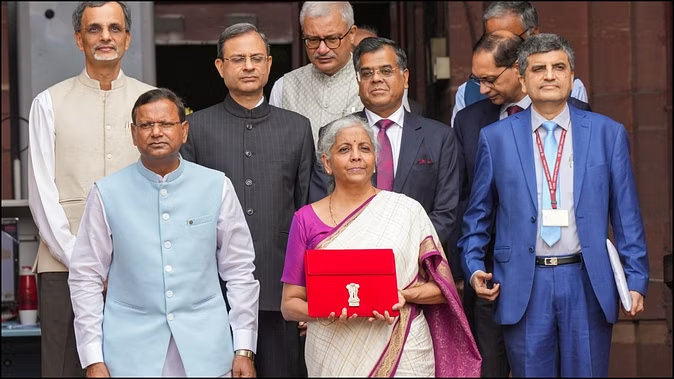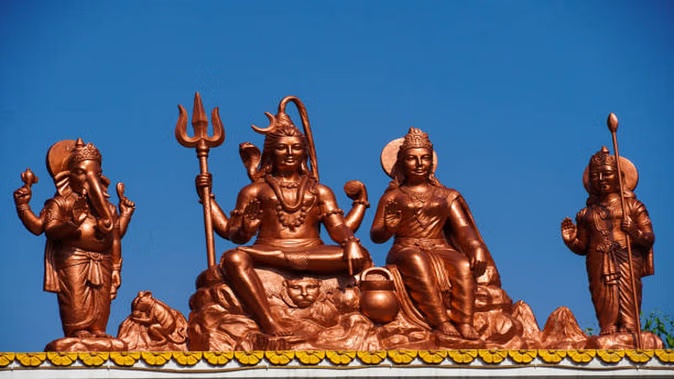The first budget of independent India was presented by the first Finance Minister Shanmukham Chetti on 26 November 1947 against the backdrop of the partition of India and terrible riots. Since then, more than 80 budgets have been presented in India. The total expenditure in the first budget presented by India's first Finance Minister Chetti was Rs 1,713 crore, in which the revenue deficit was Rs 205 crore. Whereas in the budget presented by Finance Minister Nirmala Sitharaman on 23 July 2024, the total outlay was estimated at Rs 47,65, 768 crore. This 77-year long journey of the country's annual budget is in itself the saga of a long leap in India's development journey. This saga is not only of economic but also of all-round development.

At the time of independence, the country was going through a very difficult phase. After centuries of slavery, as soon as we saw the light of independence, along with the human tragedy of partition and terrible riots, hunger and poverty were also staring us in the face. Whereas today our country is on the path of becoming the economic superpower of the world and after reaching the moon, it is taking one leap after another in space.
Mention of difficult circumstances in the budget speech
When the first finance minister of independent India, Shanmukham Chetty, presented his first historic budget on 26 November 1947 in the Constituent Assembly building (later Parliament House), he mentioned in his speech the various challenges including the economic and financial condition of the country and also the circumstances of the partition and terrible riots. He especially mentioned the riots of Punjab and North Frontier and also mentioned the heavy price paid by the nation for that unrest. The meaning of this mention was that we can progress India only with mutual brotherhood and harmony. If we deny this 7 decade long glorious and proud journey of development, then we will only insult the contribution of those nation-building great men.
The first budget was the foundation of India's economic development
The first budget had to address the immediate challenges of nation-building, including reconstruction efforts after partition and establishing a stable economic framework for the newly independent nation. The first Union Budget set the direction of India's economic policies in the post-independence era, with an emphasis on self-reliance, industrial development, and social welfare. The first Union Budget of independent India was an important step in laying the foundation of India's economic development and addressing the challenges of a newly independent nation.
India was faced with the challenge of rebuilding its economy after independence from British rule at that time. There was the challenge of a huge and diverse population in front of the limited financial resources and infrastructure of that time. Ensuring fiscal stability amid the disruptions related to partition and the need for rapid industrialization was also a complex responsibility. The early government had to address the inequalities and social injustices inherited from the colonial era, including land reform and poverty alleviation.
The first finance minister faced a mountain of challenges
When India gained independence from British rule in August 1947, it faced many economic challenges, including issues such as the rehabilitation of refugees after partition and the division of assets and liabilities with Pakistan. Despite the economic difficulties, the then government gave top priority to the security of the country and allocated a significant part of about 20 percent of the budget to defense, which reflects India's security concerns after partition. The first budget recognized the importance of agriculture and rural development in the Indian economy and emphasized these sectors. The budget proposed a taxation policy aimed at promoting industrial growth and development, including measures to encourage investment.
The difference between the budgets of then and now is huge
The difference between India's first and latest Union budgets underlines the transformation of India's economy, governance priorities, and social goals in the decades after independence. This evolution reflects India's journey from a newly independent nation facing reconstruction challenges to becoming a global economic powerhouse striving for inclusive and sustainable growth in the 21st century.
The differences and changes between the first Union Budget of independent India (1947) and the latest Union Budget (for example, Union Budget 2024) are quite significant and reflect the evolution of India's economy, governance, and priorities over more than seven decades. The first budget (1947) had a total expenditure of Rs 1,713 crore, reflecting the early phase of India's economy after independence. While the latest 2024-25 budget size was Rs 47,65, 768 crore.
The 7th budget size of Finance Minister Sitharaman is expected to increase significantly. The first budget emphasized reconstruction, stability, and managing the immediate challenges of division. Today the focus is on sustainable development, the digital economy, investment in infrastructure, and social welfare schemes. The first budget to accelerate economic growth has now seen significant focus on diverse sectors such as healthcare, education, renewable energy, digital infrastructure, and startups due to changing demographics and economic dynamics.
(PC: PTI)










